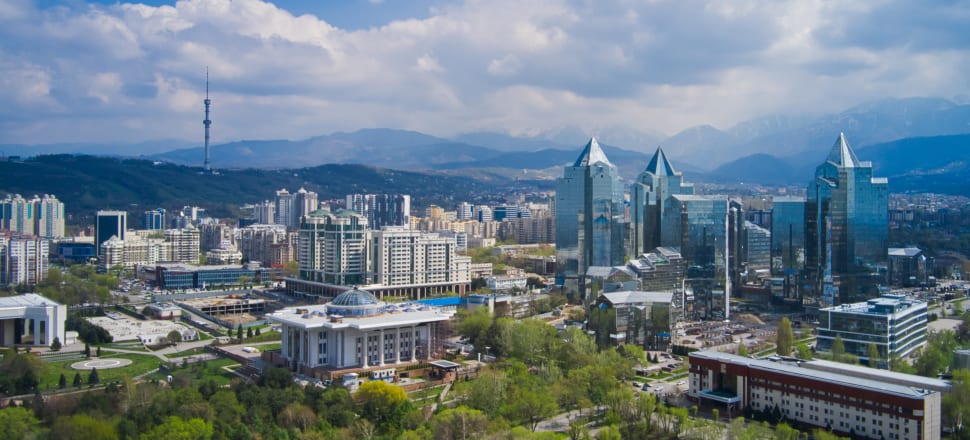
A vast sweep of 2,000 years of economic history will unfold over the next nine weeks as I cycle from Kazakhstan to Turkey along some of the Silk Roads
Opinion: Early this Sunday, I’ll hop on my bike in Almaty, Kazakhstan, and head for Istanbul – fulfilling the first part of my long-held dream of cycling from Beijing to Birmingham.
Thanks to Covid delays and disruptions, I’m starting mid-way this year and will complete the journey over the next two years.
Why would I want to ride 15,000km across Asia and Europe? Because I love cycling and long adventures, is the simple and true answer I’ve given family, friends and colleagues over recent years.
READ MORE:
* A Chinese tourism revolution heading for NZ
* Kiwifruit industry’s China dilemma
* Ten years on, China’s grand scheme faces hurdle
The bigger reason, though, is journalistic. As I ride, I want to learn lots about the past, present and future. I’m seeking answers to the twin questions that underpin all my work: how will 10 billion people live well and in the right relationship with the Earth by 2050? And what distinctive roles will we play in Aotearoa New Zealand?
But why from Beijing to Birmingham?
Beijing because I vividly remember my first visit to China in 1979. Based in Toronto, I was a business journalist on the first foreign trade mission into the country just a month after Deng Xiaoping declared China’s Open Door Policy.
That embrace of foreign trade and investment triggered the country’s astonishing recovery, growth and development. Which in turn has been the single biggest driver of the vast changes in business, economics and geopolitics I’ve grappled with in my decades as a business journalist.
Birmingham because it was one of the cradles of the industrial revolution from the late 18th Century to the mid 20th Century – and thus one of the key sources of the fossil fuel-driven technologies, steam engines first then cars later, that are causing our climate crisis today.
A key guide to the future will be examples I’ll see along the way of China’s massive industrial, infrastructure and other investments in its Belt and Road Initiative – hence “BRI by bike” is my tagline for this year’s ride
The city was renowned for its engineers, scientists, entrepreneurs and free-thinkers. It still called itself the “Workshop of the World” when I was growing up there in the 1950s and 1960s. But by the 1970s it was a failing city, economically, socially and culturally.
Now, though, it is remaking itself as a 21st Century city. Enlivened by the youngest demographic profile of any major city in Europe thanks to immigration, it is reinventing some of its traditional industries as sustainable ones while creating entirely new ones. I learned much about this transformation during a six-week research trip in 2021 before the COP26 climate negotiations in Glasgow.
So, for me this is a ride back to the future. Every day I’ll be asking myself what does all this mean to us in Aotearoa? I’ll also draw on all I’ve learned in my first 26 years to date as a Pākehā New Zealander. Oh, plus some bike-level research, including rides from Cape Reinga to Bluff in 2010 and 2020; and across the South Island in 2009 and the North Island in 2021.
One chart captures the astonishing sweep of this global story of human development. It’s based on the work of Angus Maddison, a distinguished British economist who charted the shifting “economic centre of gravity” of the world over the past two millennia.

The industrial revolution rapidly shifted the centre of gravity from Asia in 1820 to Europe by the outbreak of World War I. Then the rise of the US economy in the first half of the 20th century shifted the centre further north and west to its 1950 western apogee. But the subsequent shift back towards Asia was very slow after World War II, despite the rapid growth of Japan, South Korea and Singapore.
However, since 2000 the extraordinary growth of the Chinese economy, plus other Asian ones, has caused a phenomenally fast shift in the global economic centre of gravity east and south.
Plotting some personal points on this map, I was born in Birmingham in 1950; I began my journalism career in Toronto in 1975; my family and I emigrated to Aotearoa in 1997; and we New Zealanders signed our free trade agreement with China in 2008.
This vast sweep of 2,000 years of economic history will unfold very vividly and rapidly for me over the next nine weeks as I cycle from Almaty to Istanbul along some of the Silk Roads. My key guide to the past will be The Silk Roads: A New History of the World by Peter Frankopan, professor of global history at Oxford University.
A key guide to the future will be examples I’ll see along the way of China’s massive industrial, infrastructure and other investments in its Belt and Road Initiative – hence “BRI by bike” is my tagline for this year’s ride.
For this column, I’ll seek out people to interview in the seven countries I’ll travel though: Kazakhstan, Kyrgyzstan, Uzbekistan, Tajikistan, Azerbaijan, Georgia, and Turkey.
The route itself is telling. When I signed up in 2018 for this ride with TDA, a Canadian long-distance cycle touring company, our 2021 route was going to take us southwest down through Iran before heading up to Turkey. But such is the turmoil there now, we’re heading east to Azerbaijan and Georgia and then down to Turkey.
Should you be interested in my cycling stories and travellers’ tales, I’ll write about those each evening on my website.







